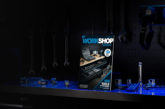
The Independent Garage Association (IGA) has been continuing its work with the Intellectual Property Office (IPO) in supporting the national ‘Fake Always Breaks’ campaign.
The campaign highlights the dangers of counterfeit vehicle parts and the importance of vigilance across the motor trade.
The recent seizure of over £100,000 worth of fake automotive components in South Gloucestershire, including spark plugs, filters and sensors, is said to underscoreswhy this ongoing collaboration is so vital. The discovery demonstrates the persistent threat posed by counterfeit vehicle parts to both motorists and the independent garages that serve them.
Counterfeit parts are often made from inferior materials and do not undergo the rigorous safety testing required of genuine components. As a result, they are far more likely to fail, putting drivers, passengers and other road users at serious risk.
The IGA continues to work closely with the IPO to raise awareness across the independent garage sector, ensuring workshops can identify, report, and avoid counterfeit vehicle parts. Through regular communications, guidance and educational resources, the IGA is helping members remain vigilant when sourcing and fitting parts, particularly as demand increases during the busy winter service season.
Jonathan Douglass, Director of the IGA, said: “This recent seizure is a stark reminder of the risks counterfeit parts pose to motorists and garages alike. Independent workshops are on the frontline of vehicle safety, and it’s vital they have the knowledge and tools to protect their customers.
“Our ongoing work with the Intellectual Property Office as part of the ‘Fake Always Breaks’ campaign is helping raise awareness across the independent garage sector. By staying alert to the risks and sourcing only from trusted suppliers, garages can safeguard their customers, their businesses, and Britain’s roads.”
The IGA has urged all independent garages to familiarise themselves with the IPO’s guidance on how to spot and report counterfeit parts. Warning signs include vague product descriptions, poor-quality packaging, missing safety information, and unfamiliar or misspelled branding.









